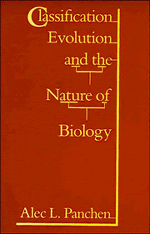Book contents
- Frontmatter
- Contents
- Acknowledgements
- CHAPTER 1 INTRODUCTION
- CHAPTER 2 PATTERNS OF CLASSIFICATION
- CHAPTER 3 PATTERNS OF PHYLOGENY
- CHAPTER 4 HOMOLOGY AND THE EVIDENCE FOR EVOLUTION
- CHAPTER 5 GEOLOGICAL AND GEOGRAPHICAL EVIDENCE
- CHAPTER 6 METHODS OF CLASSIFICATION: THE DEVELOPMENT OF TAXONOMY
- CHAPTER 7 METHODS OF CLASSIFICATION: PHENETICS AND CLADISTICS
- CHAPTER 8 METHODS OF CLASSIFICATION: THE CURRENT DEBATE
- CHAPTER 9 CLASSIFICATION AND THE RECONSTRUCION OF PHYLOGENY
- CHAPTER 10 IS SYSTEMATICS INDEPENDENT?
- CHAPTER 11 MECHANISMS OF EVOLUTION: DARWINSM AND ITS RIVALS
- CHAPTER 12 MECHANISMS OF EVOLUTION: THE SYNTHETIC THEORY
- CHAPTER 13 SCIENTIFIC KNOWLEDGE
- CHAPTER 14 PHILOSOPHY AND BIOLOGY
- References
- Author index
- Subject index
CHAPTER 10 - IS SYSTEMATICS INDEPENDENT?
Published online by Cambridge University Press: 03 May 2011
- Frontmatter
- Contents
- Acknowledgements
- CHAPTER 1 INTRODUCTION
- CHAPTER 2 PATTERNS OF CLASSIFICATION
- CHAPTER 3 PATTERNS OF PHYLOGENY
- CHAPTER 4 HOMOLOGY AND THE EVIDENCE FOR EVOLUTION
- CHAPTER 5 GEOLOGICAL AND GEOGRAPHICAL EVIDENCE
- CHAPTER 6 METHODS OF CLASSIFICATION: THE DEVELOPMENT OF TAXONOMY
- CHAPTER 7 METHODS OF CLASSIFICATION: PHENETICS AND CLADISTICS
- CHAPTER 8 METHODS OF CLASSIFICATION: THE CURRENT DEBATE
- CHAPTER 9 CLASSIFICATION AND THE RECONSTRUCION OF PHYLOGENY
- CHAPTER 10 IS SYSTEMATICS INDEPENDENT?
- CHAPTER 11 MECHANISMS OF EVOLUTION: DARWINSM AND ITS RIVALS
- CHAPTER 12 MECHANISMS OF EVOLUTION: THE SYNTHETIC THEORY
- CHAPTER 13 SCIENTIFIC KNOWLEDGE
- CHAPTER 14 PHILOSOPHY AND BIOLOGY
- References
- Author index
- Subject index
Summary
The title of this chapter is taken from the title of Brady 's (1985) paper “On the Independence of Systematics” (see Chapter 8, Section I) in which he seeks to show that as explanandum the pattern of classification has logical priority over the pattern of phylogeny as explanans. I have urged the logic of this stance several times so far in this book, but the stance, justifying transformed cladistics, is a difficult one for an evolutionary biologist to maintain. This seems even to be the case for transformed cladists, who at the time of writing are much less vehement in their rejection of phylogeny in taxonomic methodology than they were in the early 1980s. Pure transformed cladistics is appealing in its simplicity and austerity and in requiring no justification of its cladograms by appeals to the pattern or processes of phylogeny, but it is undermined by two principal factors. The first is the lack of any explicit justification of the axiom of hierarchy which must underlie an independent taxonomy claiming to elucidate a natural pattern. The second is the claim, if correct, that the pattern of a cladistic classification can be refuted, or at least questioned dangerously, by appeals to fossil evidence and or the adaptive explanation of characters.
In discussing these problems, this chapter will act as a critical summary of all the data and ideas I have presented so far which bear on the nature of the classification of living organisms.
- Type
- Chapter
- Information
- Classification, Evolution, and the Nature of Biology , pp. 225 - 247Publisher: Cambridge University PressPrint publication year: 1992



